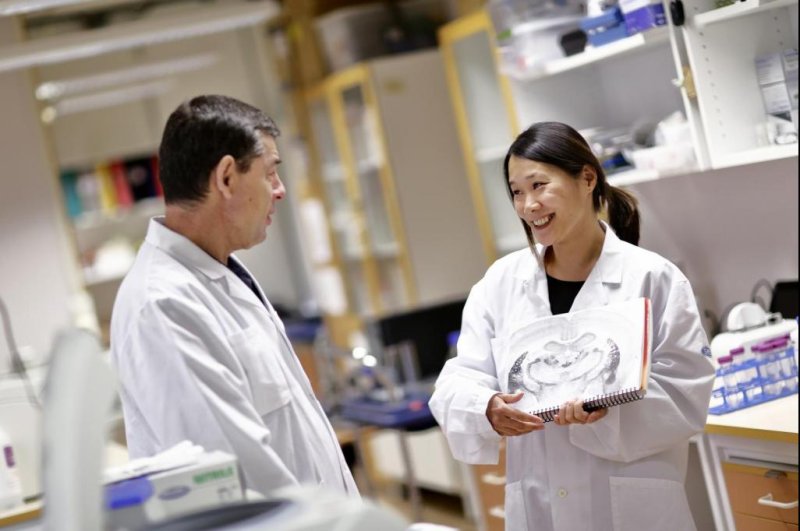During development of alcohol dependency, production of an enzyme in the brain tied to impulse control goes down, according to a study by Professor Markus Heilig, left, and Dr. Estelle Barbier at Linköping University. Photo by Peter Holgersson/Linköping University
LINKöPING, Sweden, Aug. 30 (UPI) -- Researchers in Sweden identified an enzyme that stops being produced in the brain when alcohol dependency develops, leading to further loss of impulse control.
Lack of production of the enzyme PRDM2 leads to lack of impulse control, causing alcohol dependent people to continue drinking regardless of the consequences, according to experiments with mice at Linköping University in Sweden.
Previous research has suggested lower expression of PRDM2 is linked to the development of some cancers, but researchers at Linköping say its function in the brain was unexpected.
The researchers have been studying the effects of addiction on the brain based on theories linking dependence to impaired function of the frontal lobe of the brain, which plays a big role in impulse control.
"PRDM2 controls the expression of several genes that are necessary for effective signalling between nerve cells," Dr. Markus Heilig, a professor of psychiatry at Linköping University, said in a press release. "When too little enzyme is produced, no effective signals are sent from the cells that are supposed to stop the impulse."
For the study, published in the journal Molecular Psychiatry, researchers found alcohol dependence in rats caused lower levels of PRDM2 to be produced in their brains.
The lack of the enzyme caused the rats to continue drinking alcohol, even if it was unpleasant and especially if they were subjected to stress. To test the observation, the researchers then knocked out production of PRDM2 in the brains of non-addicted rats, finding the same predilection to drink alcohol as though they had developed a dependency.
"We see how a single molecular manipulation gives rise to important characteristics of an addictive illness," Heilig said. "Now that we're beginning to understand what's happening, we hope we'll also be able to intervene. Over the long term, we want to contribute to developing effective medicines, but over the short term the important thing, perhaps, is to do away with the stigmatization of alcoholism."















